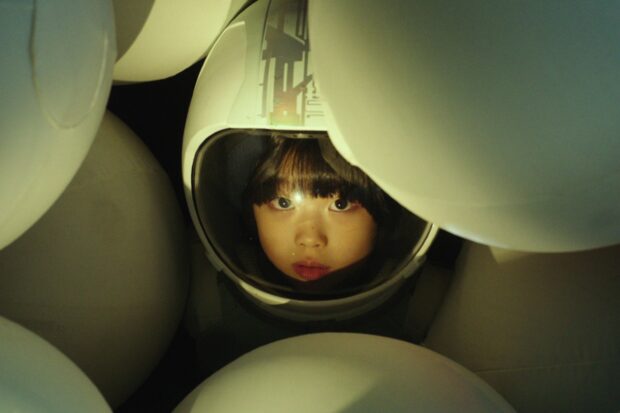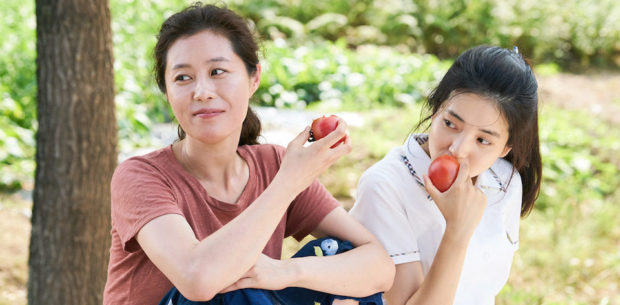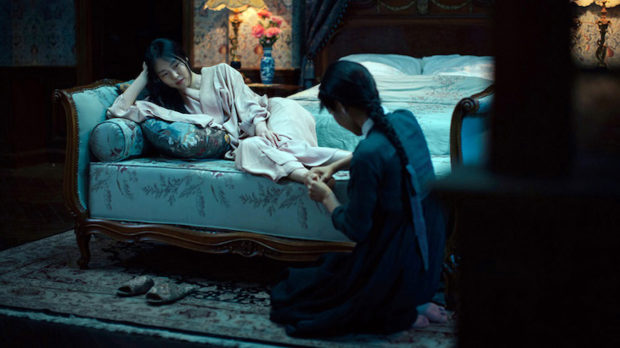Space junk is a genuine problem. With humans shooting things and people into space since the 1950s, there’s an estimated 128 million pieces of manufactured space debris larger than 1 millimetre floating about in our orbit. It was the basis for the popular Japanese manga/anime Planetes, and a launching point for Jo Sung-hee’s (Phantom Detective) latest film.
SPACE SWEEPERS (승리호) takes place in 2092. Earth is no longer habitable, and the orbital utopia built by UTS corporation is only available to the elite. Other people try and eek out a living with what little they have, including the crew of the Victory, a space ship that collects junk for money.
When the ragtag group – who includes former space guards and special forces members Tae-ho (Song Joong-ki), Captain Jang (Kim Tae-ri), drug king Tiger Park (Jin Seon-kyu) and a robot named Bubs (Yoo Hae-jin) – encounter a small girl named ‘Dorothy’ (Park Ye-rin), their fortunes change. They have either set themselves up for the profit or fight of their life, especially when UTS head James Sullivan (Richard Armitage) gets involved.

Jo Sung-hee had reportedly been working on the film for 10 years in some form or another, constantly looking for ways to differentiate it from similar genre films. There are the Korean elements, of course, with characters sliding in and out of languages depending on the context. Yet there’s also the effort that Jo and his team have put into world building, crafting something that is unquestionably futuristic but also lived-in.
Adding to this greatly are the stunning special effects and production design. The visual effects company Dexter Studios, who brought Along with the Gods: The Two Worlds and Ashfall to the screen on a similarly larger-than-life canvas, have outdone themselves here. Massive scale docking stations, ships and eventually dogfights fill the screen in true blockbuster fashion. It’s kind of like Moebius designed a Marvel film and infused it with pure Hallyuwood enthusiasm.
Yet to mistake this for a ‘mere’ effects film is to do it a great disservice. This is a animated film that just happens to be live action. Like the finest sci-fi, it’s a character drama in space, and each of these people comes layered with backstory, their own motivations and actual growth by the end of the picture. It really helps that in contrast Richard Armitage is basically an anime villain, joining a long line of bearded gaijin (or waeguk-saram if you prefer).

The cast is excellent as you’d expect. Song Joong-ki rejoins Jo after their previous collaboration on A Werewolf Boy (2012). Kim Tae-ri, who impressed us in The Handmaiden and Little Forest, is at her kick-ass best here. The award-winning Yoo Hae-jin (A Taxi Driver) is unrecognisable as the voice of a CG robot, whose character arc sees them saving up money for a gender reassignment procedure.
In any other year, we may have seen this hit global cinemas in limited release. Thanks to the wonders of streaming, the audience reach has expanded for this crowd-pleaser exponentially. So, if 2020 was the year that Korean cinema got global attention, then SPACE SWEEPERS might signal the breadth of what the nation’s film offerings might be.
2021 | South Korea | DIRECTOR: Jo Sung-hee| WRITERS: Yoon Seung-min, Yoo-kang Seo-ae, Jo Sung-hee | CAST: Song Joong-ki, Kim Tae-ri, Jin Seon-kyu, Yoo Hae-jin, Richard Armitage | DISTRIBUTOR: Netflix (Global)| RUNNING TIME: 136 minutes | RELEASE DATE: 5 February 2021 (AUS)







